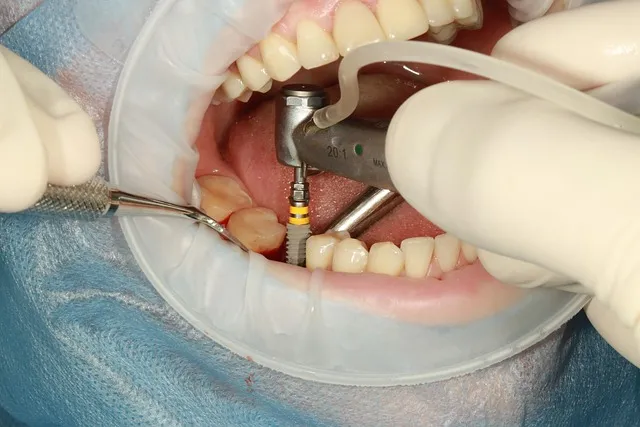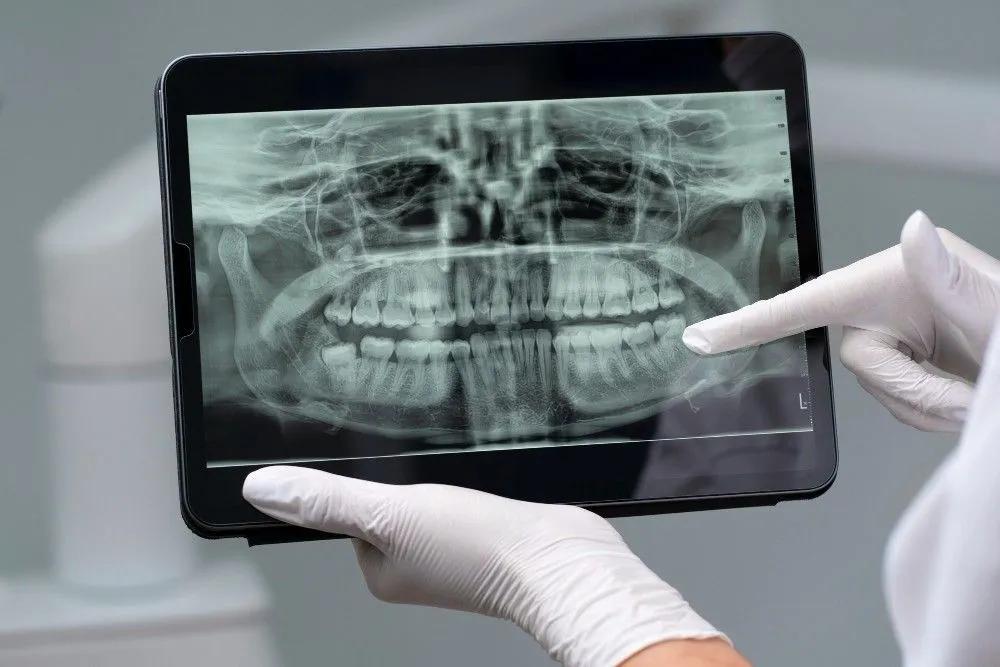After a root canal, it can feel like alien life forms have invaded your mouth. The feeling won't last long, just a few days, as the outside bacteria are repelled by the antibacterial properties of your saliva and will leave once they're gone. Eating again after a root canal is safe, but what foods should you avoid? Unfortunately, there isn't one exact list that covers everything under the sun.
A lot depends on a person's sensitivity to particular foods, so an outline of some general recommendations should help you find some tasty alternatives if necessary. Well, if the question is, What can I eat after a root canal? The answer is "Just warm food". Furthermore, this blog will briefly guide you about "what to eat after a Root canal treatment."
 Surgery is needed when a bacterial infection damages the pulp around your teeth. Surgery procedures remove the infected pulp, and the nerve is in the canal's root. Then it is filled with some artificial materials and seals the space. Your dentist will place a Crown on the tooth to protect and restore it to its original function.
Surgery is needed when a bacterial infection damages the pulp around your teeth. Surgery procedures remove the infected pulp, and the nerve is in the canal's root. Then it is filled with some artificial materials and seals the space. Your dentist will place a Crown on the tooth to protect and restore it to its original function.
 Many signs and symptoms describe your need for a root canal. Some of them are given below —
Severe tooth pain upon eating:
Many signs and symptoms describe your need for a root canal. Some of them are given below —
Severe tooth pain upon eating:
 Many root canal patients choose to avoid meat, dairy products, and other types of solid fats like butter and margarine, as well as refined flour products because they're rich in carbohydrates. These foods stimulate saliva production, making you more likely to bleed. However, if you're avoiding other types of solid fats, you can still enjoy foods like avocado, olive oil, nuts, and seeds.
Unsweetened fruit juices, pureed soups, and unfermented soy products are also best avoided. Fermented soy products like miso and tempeh contain beneficial bacteria and compounds that may be helpful for healing, but unfermented soy is a major cause of soy allergies.
Many root canal patients choose to avoid meat, dairy products, and other types of solid fats like butter and margarine, as well as refined flour products because they're rich in carbohydrates. These foods stimulate saliva production, making you more likely to bleed. However, if you're avoiding other types of solid fats, you can still enjoy foods like avocado, olive oil, nuts, and seeds.
Unsweetened fruit juices, pureed soups, and unfermented soy products are also best avoided. Fermented soy products like miso and tempeh contain beneficial bacteria and compounds that may be helpful for healing, but unfermented soy is a major cause of soy allergies.
When is a root canal needed?
 Surgery is needed when a bacterial infection damages the pulp around your teeth. Surgery procedures remove the infected pulp, and the nerve is in the canal's root. Then it is filled with some artificial materials and seals the space. Your dentist will place a Crown on the tooth to protect and restore it to its original function.
Surgery is needed when a bacterial infection damages the pulp around your teeth. Surgery procedures remove the infected pulp, and the nerve is in the canal's root. Then it is filled with some artificial materials and seals the space. Your dentist will place a Crown on the tooth to protect and restore it to its original function.
Signs and Symptoms For a Root Canal:
 Many signs and symptoms describe your need for a root canal. Some of them are given below —
Severe tooth pain upon eating:
Many signs and symptoms describe your need for a root canal. Some of them are given below —
Severe tooth pain upon eating:
- Feeling pressure in the tooth
- Discoloration of the tooth
- Swelling of the gums
- Difficulty in eating
- Persistent pain in the gums
What can I eat after a root canal?
Following are some foods and drinks which are recommended to eat after root canal surgery.- Soup — As no pressure is applied to chew the soup, it is drinkable, so it is recommended to take it after root canal surgery.
- Eggs — Eggs consist of high protein, which can help you recover after surgery.
- Fruits — Fruits like bananas, mangoes, and pears are advised to take after root canal surgery.
- Mashed vegetables — Vegetables like potatoes and cauliflower can help you in providing fiber to the body.
- Pancakes — These are soft bread-like and can be chewable easily.
- Oat Meal — Oats are responsible for providing fiber to the body
- Tofu — Consists of coagulating soy milk; due to this, they are soft, which makes them eatable after a root canal.
- Yoghourt - Yoghurt provides an excellent digestible enzyme to the body.
What not to Eat After A Root Canal Procedure:
 Many root canal patients choose to avoid meat, dairy products, and other types of solid fats like butter and margarine, as well as refined flour products because they're rich in carbohydrates. These foods stimulate saliva production, making you more likely to bleed. However, if you're avoiding other types of solid fats, you can still enjoy foods like avocado, olive oil, nuts, and seeds.
Unsweetened fruit juices, pureed soups, and unfermented soy products are also best avoided. Fermented soy products like miso and tempeh contain beneficial bacteria and compounds that may be helpful for healing, but unfermented soy is a major cause of soy allergies.
Many root canal patients choose to avoid meat, dairy products, and other types of solid fats like butter and margarine, as well as refined flour products because they're rich in carbohydrates. These foods stimulate saliva production, making you more likely to bleed. However, if you're avoiding other types of solid fats, you can still enjoy foods like avocado, olive oil, nuts, and seeds.
Unsweetened fruit juices, pureed soups, and unfermented soy products are also best avoided. Fermented soy products like miso and tempeh contain beneficial bacteria and compounds that may be helpful for healing, but unfermented soy is a major cause of soy allergies.
1. Dairy Products
If you'd like to add calcium to your diet, skim and low-fat milk are OK to drink, but full-fat cheeses and creams are best avoided. While they're packed with protein, they're rich in lactose, a carbohydrate that your body can't easily digest. If you're keen to have dairy, you can do a few things to make it less likely to cause a flare-up. Try eating yogurt or cottage cheese with fruit and other low-lactose foods before the root canal, or use lactose-free products.2. Fried Foods and starches
Processed foods, including white bread and other starchy foods like potatoes and pasta, are commonly avoided by root canal patients because they're rich in refined carbohydrates. However, there are a few exceptions. Unrefined bread like bagels, pitas, and tortillas tend to be relatively low in sugars and can still be digested by the bacteria in the mouth. They're also a source of carbohydrates and protein and can be eaten as a side dish to other healthy foods. White rice is a low-sugar carbohydrate but starch and should be avoided after a root canal. Brown and wild rice, however, are rich in antioxidants and anti-inflammatory polyphenols and are a healthy choice.3. Unsweetened fruit juices and pureed soups
It's best to avoid fruit juices, and canned, and pureed soups because they're rich in sugary, unfermented fructose. Refined sugars can ferment in the mouth, leading to a build-up of bacteria and a risk of infection. Unfermented, low-sugar fruits like berries, avocados, kiwis, and tomatoes, are still rich in vitamin C and other nutrients and are a healthy choice. Fresh fruit can be eaten as a snack or a more substantial meal.4. Solidified fats and proteins
Avoid eating heavy, solid foods after a root canal because they're rich in solid fats and proteins that can harden into a plaque-like substance if swallowed too quickly. This can lead to excess bleeding and a risk of infection. Fresh vegetables, soups, fresh fruit, low-fat yogurt, and low-fat sour cream are all good for rehydrating the mouth and restoring its natural pH.- Other post-surgery practices
- Experiencing soreness in the tooth canal is normal after Canal surgery. You can control this by taking painkillers. Some of the points to remember after root canal surgery are described below —
- Maintaining hygiene around the mouth and brushing the teeth regularly to maintain good oral hygiene.
- Gargling with salt and water three times a day reduces pain and inflammation. You can use lukewarm water mixed with half a teaspoon of salt for gargling.
- Use flossing to refrain from either side of the Crown to prevent blocking and sticking of two to each other.
Other Precautions to take after a root canal -
After a root canal, avoiding spicy foods, alcoholic beverages, and sugary treats is also a good idea. These can make the mouth even drier and increase the flare-up risk. You can also make the mouth more hospitable by rinsing it with mouthwash or gargling warm water before eating. In most cases, you can safely eat whatever you want once you recover from the procedure. However, if you're in a period of healing following the root canal, it's probably best to steer clear of certain foods. There are, however, a few other dietary tips that can help you get through a healing period following a root canal.When to visit the doctor?
Usually, most people don't get serious side effects after root canal surgery. It is important to know when and in what conditions you should visit our doctor after noticing some complications in the mouth. These complications include —- Feeling pressure in the mouth.
- Irritations and allergic reactions
- Fever
- Swelling of the mouth
- irritate sensation in the mouth
Conclusion
In root canal surgery, knowing what you should eat is important. Root canal surgery procedures are done with anesthesia. Your dentist will provide you with all the instructions post-surgery and follow up with them about any questions or concerns you have before and after the procedure. This article studies what not to eat and what to eat after root canal surgery.
Reviewed by







